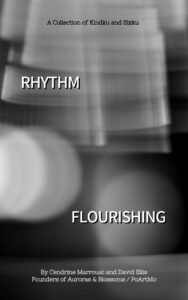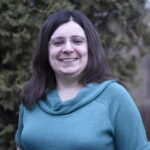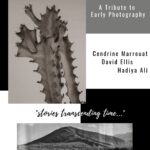 Poets Cendrine Marrouat and David Ellis join me today to chat about their new chapbook, Rhythm Flourishing: A Collection of Kindku and Sixku.
Poets Cendrine Marrouat and David Ellis join me today to chat about their new chapbook, Rhythm Flourishing: A Collection of Kindku and Sixku.
Bio:
French-born Canadian Cendrine Marrouat lives in Winnipeg. She is a photographer, poet,multi-genre author, and the co-founder of several artistic projects. She is also the creator of the Sixku, the Reminigram, and the Flashku.
Cendrine started her career in 2003. She has worked in many fields, including education (language instruction), social media coaching and training, content creation and curation, translation, photography, poetry, theatre, art criticism, blogging, and journalism.

David Ellis lives in Tunbridge Wells, Kent in the UK. He is an award-winning poet, author of poetry, guidebooks, workbooks, humourous fiction and music lyrics.
David’s debut poetry collection (Life, Sex & Death) won an International Award in the Readers’ Favorite Book Awards 2016 for Inspirational Poetry Books.
David is extremely fond of tea, classic and contemporary poetry, cats, and dogs but not snakes. Indiana Jones is his spirit animal.
Cendrine and David co-founded Auroras & Blossoms in 2019.
A&B is dedicated to promoting positive, uplifting and inspirational art; and giving artists of all levels a platform where they can showcase their work and build their publishing credits. artistic movement (PoArtMo), an artist collective (PoArtMo Collective), a monthly show, and marketing/promotional books to help writers and authors at every level of their careers.

What do you enjoy most about writing poems?
Cendrine: I have always enjoyed how poetry allows me to tackle hard topics. Like with theatre, it is the unsaid, what has to be read between the lines, that matters.
I have written poems about about death, faith, suicide, discrimination, and racism. I do not think people would have reacted so positively if they had been part of a novel…
David: For me, it is a way to connect on a deep, emotional level with people that I have never met. I enjoy the thought that by giving myself inspirational advice, courage or self-confidence to tackle the issues we face in our everyday lives in the poetry that I write. I’m creating something that can also be shared with readers who want to experience real meanings and guidance that they can relate to positively on some personal level.
Poetry to me is similar to songs, in the way that it speaks directly to our souls and nourishes the very fibre of our being. It can deliver lyrical impact that no other piece of writing can in such a short handful of words. As an art form, it is achingly beautiful and intricate, its influence resonates long after it has been seen or heard.
Can you give us a little insight into a few of your poems – perhaps a couple of your favorites?
Cendrine: It is hard for me to pick a few poems, as they all have a special place in my heart. However, had you asked me the same question a few years ago, my answer would have been different.
For the last three or four years, my writing process has changed. While I always start with a title or specific idea, words alone do not pop up in my mind. Now, I tend to visualize scenes a lot more and to close my eyes as I write. I find it to be a very effective way to immerse myself in emotions, which in turn allows me to portray them better and more concisely in my writing.
David: Every time I write a new poem, it could potentially become my favourite! I would say that whenever you approach a subject or theme, with a view to turning the situation/experience into a poem, be sure to treat it with child-like wonder and enthusiasm. Each poem you write should feel like a fresh, brand new entity that you are about to shape, nurture and bring into the world. I believe in doing something well, to the absolute best of your ability. When it is done and you can improve on it no more, that is when it feels right. You will know when you read your poem out loud whether it speaks to the very core of who you are.
When writing poetry, there should be some elements in the themes and messages that you identify with the most. This will be what drives the direction of the poem. It’s why my poetry is imbued with inspirational and romantic motifs because these are the things I believe in or yearn for the most in life. As a direct outcome and consequence of this, your poetry will become infinitely more relatable to your readers, which will keep encouraging you to write more of it!
What form are you inspired to write in the most? Why?
Cendrine: I consider myself a minimalist writer. I suck at writing descriptions. Anything short, concise and punchy is my jam.
That’s why I have written so many haiku! I like how powerful they can be and how they allow you to say so much in such few words.
My other favorite forms are the one I have invented or co-invented with David. They are all based on the Haiku.
The Sixku is a six-word, untitled poem that must include an image.
The Kindku is an invitation to promote kindness, positivity and inspiration through poetry. Each piece contains seven lines and must use seven words taken from a specific source.
The Pareiku is a unique type of art that features the visual and poetic elements. Two seemingly unrelated images are linked together as one by a short 19-syllable poem that follows the 7/5/7 syllable pattern.
Finally, I have recently invented a new literary genre called the Flashku, which also borrows from the Sixku, Kindku and flash fiction.
David: When I first started writing poetry, I explored a variety of different freeform styles involving poetic prose. I was also very keen to explore forms that had mathematical restrictions (perhaps limited numbers of lines/syllable counts) or involved repetition of specific phrases/words/rhyming schemes. to my own sensibilities, poems were all about attempting to solve lyrical puzzles in my head, which made it all the more satisfying when a coherent romantic, inspirational, humorous or philosophical message presented itself within.
I would say that my favourite form of the last few years though has been without a doubt ‘found poetry’ (also known as ‘blackout poetry’). With it, I can find an infinite amount of inspiration in the world around me, I have so many literary resources available at my disposal that I can use to create wonderful pieces of writing. I end up constantly surprising myself, as I usually don’t know what direction my writing will take with found poetry until the poem reveals itself when it is finished!
What type of project are you working on next?
We plan on releasing several books in 2021 — individually and together. They will all be multimedia projects mixing poetry and photography. One of them will at least include all the members of our PoArtMo Collective, so you can expect drawings added to the mix.
One thing we have learnt in all of our collaborations is that we have many different genres that we want to encompass with all of our writing and our art. At the heart of it all are two very passionate creative artists, who are dedicated to providing the most engaging art possible that captures a sense of excitement, intrigue and generates respect for the endeavours of our artistic communities.
When did you first consider yourself a writer / poet?
Cendrine: When you interviewed me a decade ago, I remember telling you that it was only a few years after releasing my first books. In hindsight now, I realize that things started much earlier for me — as early as the first poem I wrote in 2005.
David: I had always thought of myself as a writer way back in my teens, when I first dabbled with penning a “Choose Your Own Adventure” book. I actually crafted it by hand, which seems quite quaint now. English language and literature have always fascinated me, when I was at school they were subjects that I particularly excelled in the most. In my late twenties, I developed an intense passion for music and song lyrics. This is the focal point that I believe was the nucleus of me becoming both a serious writer and poet, as my spoof song lyrics evolved naturally into poetic structures. Later in life, I found my calling writing inspirational/romantic poetry and I feel grateful for all of my life experiences that have influenced everything I have written up until now.
I think a lot of writers/poets find themselves thinking that they are “aspiring writers” but on a personal level, I think I really felt like a legitimate writer/poet after I published my first book, so I know where the thought process is coming from. If you get yourself published in a collection or anthology then congratulations, consider that a milestone of your career but remember, you are never an “aspiring writer”, you are always a writer, period! The more writing that you do, the more skilled you will become at your craft and the more interesting your work will be to read!
How do you research markets for your work, perhaps as some advice for not-yet-published poets?
As artists, authors, and co-creators / co-editors of a magazine, we have acquired special experience and insights into the publishing process. We have a strategy for each book, as audiences vary and what worked before is unlikely to work again.
Publishing a book is the (very) easy part. Real work starts when it’s time to market it. It takes a lot of patience, research and commitment to promote a book successfully.
If your goal is not to publish a book but to be published in a magazine or journal, one of the best strategies would be to read, understand and follow any rules or guidelines that the publication has in place. Consider looking at Submission Managers, so you can keep track of your work, examples of these would be Duotrope and Submittable. Be respectful of the magazines/journals you are applying to, as they generally have to deal with hundreds of submissions. Don’t bother submitting to places that are not interested in the genre of writing that you specialise in, as you will be wasting your time.
Whichever writing path you choose to take, be sure to create a Press Kit for yourself. It will make approaching publications a hell of a lot easier and instantly command respect for you as a writer too.
What would you say is your interesting writing quirk?
Cendrine: I cannot write anything without a title first! And even after a career of 16 years, I am still one of the slowest writers on this planet. lol!
David: I’m now getting to the point where I am such a tea fiend that I need at least one cup of tea inside me before my body co-operates when it comes to doing any writing at all. If I want my muse to show up, then there had also better be biscuits or a cheeky slice of cake available too!
As a child, what did you want to be when you grew up?
Cendrine: Many things! I remember wanting to be a doctor, vet or teacher. I taught French to adults for 17 years and have worked in several fields in my career. They have all led me to be where I am today. From the 30+ books I have released to Auroras & Blossoms, poetry and photography, I am very proud of what I have achieved so far.
David: I think from memory, I fancied being a kung fu fighting snooker champion and rock star! As an adult, I adore being a writer because it allows me to be/do all of those things and unlock many hundreds more!
Anything additional you want to share with the readers?
The education system has taught people to fear poetry. As a result, they see it as arcane and layered in mysterious meanings.
Our goal is to demystify poetry by pairing it with visual elements. We want people to learn to embrace the words, so they can reveal their essence over time. And based on what our readers have shared with us, we believe that we have already achieved part of that goal!
Poetry can give you so much for so little of your time. Not all of it will be relevant for you but we guarantee you will find some of it to be of such importance and relevance, it will change the way you see and appreciate the special moments that are all around us just waiting to be discovered.
Links:
Website | Facebook | Twitter | Instagram | YouTube | Rhythm Flourishing | Seizing the Bygone Light

